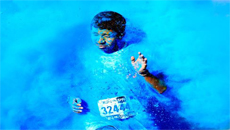Harriet Tubman once said, “Every great dream begins with a dreamer. Always remember, you have within you the strength, the patience and the passion to reach for the stars to change the world.” A dreamer was born in Quesnel and a scientist was raised in Surrey. His journey took him to the University of British Columbia where he graduated with his Bachelor of Science degree. Under the supervision of Professor Jen Love he finished his undergrad thesis project. From there, he entered the work force. He had the opportunity to work with two pharmaceutical companies: Cardiome Pharma and Active Pass Pharmaceuticals. Working at Cardiome allowed him to work on the process of developing Vernakalent, an anti-arrhythmia drug, which led to its commercialization. Who am I talking about? I’m talking about Bal Kang, a PhD student from Simon Fraser University, who was honoured with the Marie Curie Postdoctoral Fellowship. This prestigious award is worth more than $270,000 US and allows Kang to continue his research at the University of Oxford after he graduates in June.
Kang has always been interested in the field of science. As a child, Kang was extremely curious and wanted to know how everything functioned, “I have always been interested in the minute details and knowing how or why something works.” With the Surrey Public Library at arms length, Kang was always reading science-fiction and science books. His love for chemistry began in high school, however after working with Cardiome, he made the decision to focus on organic chemistry.
Kang enjoys organic chemistry for a number of reasons, as “it allows you to create complex things out of basic building blocks. It is always challenging; you are always in the search for the perfect reaction or route, you have to look at it as a puzzle, and try to find the best way to solve that puzzle.”
He goes on to say, “there is always a new state-of-the art technique that needs to be developed to respond to the changing needs in the field. What we make could end up becoming important drugs or natural pesticide alternatives that could have a potentially large societal impact. The methods that we develop are not only applicable to pharmaceutical or agrochemical industries, but also to the materials, petrochemical and plastics industries.”
During the course of five years at SFU, Kang was awarded the most prestigious scholarships totalling over half a million dollars, including the Michael Smith Foundation for Health Research Senior Fellowship; NSERC CGS-D Alexander Graham Bell scholarship; SFU Graduate Fellowship; and SFU President’s Research Stipend. He’s also had the pleasure of travelling to a number of international conferences, from the Zing Conference in Antigua to the BOSS conference in Belgium, to present the results of his research.
However, things have not always been all fun and games. Kang says one of the biggest challenges he found is “one that’s faced by all scientists in North America. With policies based on ideologies rather than evidence, science is usually the first place where funding gets cut.” Kang further states “historically it can be seen that in the long-term, it is crucial to fund science, engineering and the maths; politics has become an environment in which balancing books with a politic term is the focus.”
Another challenge that Kang’s faced is proving the importance of the sciences to the population as a whole, “It is particularly difficult communicating this within a community where English is not the first language. These are important challenges that I as a scientist must overcome because if the average person does not understand, they will not care; thus, advancing policies focused around science and evidence-based reasoning can’t succeed.”
When asked who his role model is, Kang quoted a letter Sir Isaac Newton wrote to Robert Hooke, “If I have seen further it is by standing on the shoulders of giants.” He does not have just one role model, but many. Kang finds inspiration from learning and observing from the fathers of science, such as Newton, Charles Darwin, Marie Curie, Albert Einstein, John Woodward and he admires the way they committed their lives to the betterment of society. Moreover, he finds inspiration from the free thinkers in society such as Richard Dawkins, Christopher Hitchens, Bill Maher; important leaders from South Asia like Bhagat Singh, Mahatma Gandhi, and Benazir Bhutto; and the promoters of science, Neil deGrasse Tyson, Carl Sagan and David Suzuki.
His latest research project, for which he received the Oxford scholarship, is a focus on the development of new methods in synthetic chemistry so it can be applied to the synthesis of natural products. “I’m interested in making natural products – chemicals released from organisms (plants, animals, insects, etc.) with a specific biological activity in the goal of finding new treatment for a variety of diseases and ailments,” says Kang.
Furthermore, these methods will allow the production of various natural products which will reveal powerful biological activities against diseases like breast cancer, leukemia, lung cancer, colon cancer, high cholesterol, anti-parasitic and anti-fungal leading to the creation of a new drug. At Oxford, Kang says his focus will be on “development of new catalytic methods in the construction of pharmaceutically relevant compounds.” In addition, his goal is to develop new chemical transformations which will allow for the construction of complex molecular scaffolds so it’s straightforward and economically feasible. His long term goal, however is to return to Canada and “apply the new skills learned to transfer knowledge into a new generation of scientists.”
Bal Kang is inspired by many of the great men in history, but unknowingly he has also become an inspiration and role model to many future scientists and dreamers. His advice is “follow you heart. Don’t do something just because you’re good at it or someone has told you that you should. Focus on something that you love, something that is challenging and something that will make you learn and strive for more.”


